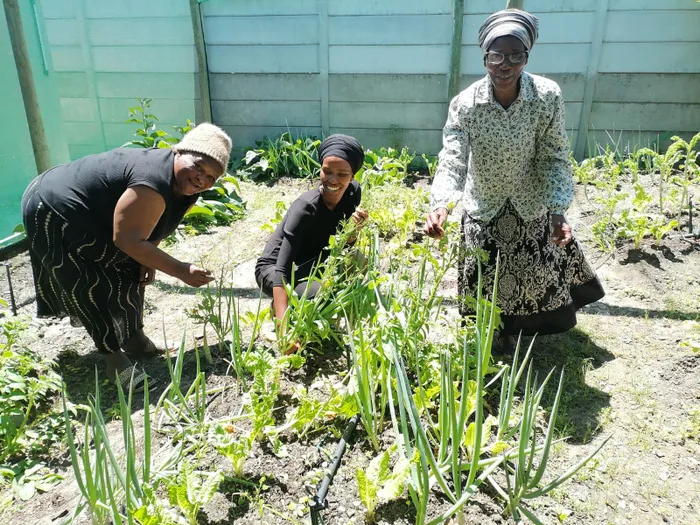Launch of Act For Change Food Garden to support community gardens
One of the leading retail groups in the country has launched its first-ever Act For Change Food Garden Competition, aimed at recognising and supporting community food gardens across South Africa.
The initiative builds on the retailer’s decade-long commitment to hunger relief and sustainable food production.
Sanjeev Raghubir, Shoprite’s chief sustainability officer, said the group began supporting community gardens ten years ago and now assists more than 300 gardens countrywide.
“As a food retailer, it is important that we contribute to hunger relief.
Food gardens produce nutritious, fresh, and organic vegetables, and we’ve seen high levels of success when communities receive consistent support,” he said. Shoprite provides seeds, tools, and most importantly-training.

Neighbourhood Old Age Homes (NOAH) members from left, Ntomboxolo Dyudwana, Asiphe Mntuyedwa, and Nomboniso Dyonta, show Vukani some of the organic vegetables they grow in their garden.
Image: Siyavuya Khaya
The programme begins with 18 months of training in composting, creating seedling beds, and learning which vegetables thrive in each season. Additional support continues based on a garden’s performance, and successful groups may also receive entrepreneurship training.
Mr Raghubir said the retail giant backs gardens initiated by communities themselves.
“Gardening requires persistence, passion, and dedication. That is why we prioritise gardens led by women and those that involve youth,” he said.
He added that school-based gardens tend to struggle because staff changes often disrupt continuity. Strong leadership, he noted, is one of the most important ingredients for sustainability.
The retail industry continues this work because the need remains significant. The company’s annual food security index shows that millions of South Africans still go to bed hungry.
“Growing vegetables helps households access a healthy and diverse diet.
There is tremendous joy when communities produce their own food and even sell it through our stores, generating income,” Mr Raghubir said.
He believes that community gardens help address these gaps by increasing access to fresh produce, building agricultural skills, and fostering communal resilience.
At the Neighbourhood Old Age Homes (NOAH) centre, coordinator Asiphe Mntuyedwa said the garden plays a vital role in supplying nutritious meals for senior citizens, especially those on chronic medication.
The competition offers R1 million in prizes, tailored to each winning garden’s needs.
The top three prizes are valued at R225 000, R200 000, and R170 000, with additional prizes of R150 000, R130 000, and R120 000 awarded to the next three winners.
Support may include irrigation systems, shade netting, fencing, or further training.
“The support we receive is massive. Growing our own organic vegetables helps us stretch our limited funds and provides seniors with healthy food," she said.
She said that the garden also offers emotional and social benefits.
“It gives our elders a chance to forget their challenges for a moment and engage in meaningful, healing activity,” she said.
Shoprite’s funding has helped NOAH acquire tools, resources, and plant boxes, contributing to the garden’s sustainability. Many senior citizens have now started their own small home gardens, inspired by the skills they gain at the centre.
NOAH sells some of its produce and hopes to eventually supply Shoprite stores.
“Organic farming takes time, but this support helps us move forward. Our elders have lived long lives and carry great wisdom-we must ensure that, in their twilight years, they feel valued and appreciated.”
One of the grannies who is part of NOAH, Nomboniso Dyonta, said she feels grateful that she is part of the organisation, and ever since she joined the organisation, her life has changed for the better.